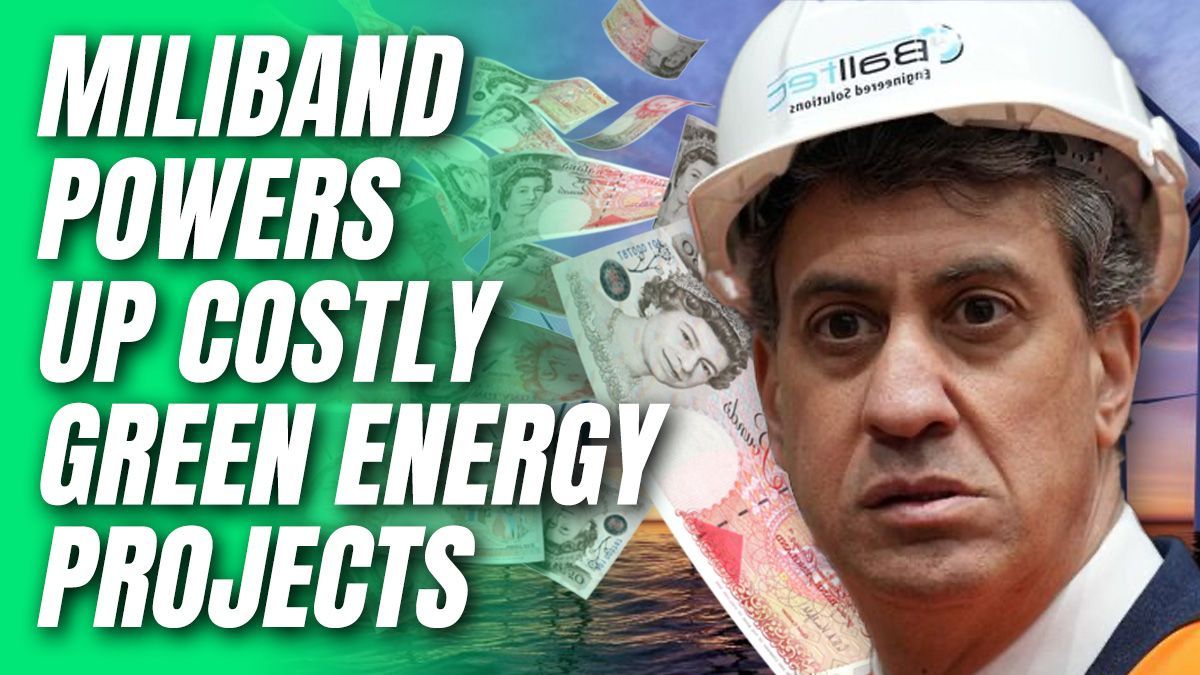Revised Energy Policies: Guido Fawkes' Perspective On The Change Of Direction

Table of Contents
Guido Fawkes' Critique of Existing Energy Policies
Guido Fawkes has consistently voiced strong concerns about the direction of UK energy policy. His criticisms center on several key areas, highlighting what he perceives as significant flaws in the current approach.
The High Cost of Green Energy
Fawkes is a vocal critic of the economic burden associated with transitioning to renewable energy sources. He argues that the pursuit of "green" energy is excessively expensive, placing an undue strain on households and businesses.
- Rising energy bills: Fawkes points to the dramatic increase in household energy bills as a direct consequence of the government's push for renewable energy. He often highlights the disproportionate impact on low-income families.
- Impact on businesses: He argues that the high cost of green energy makes British businesses less competitive internationally, potentially leading to job losses and economic stagnation.
- Government subsidies: Fawkes is highly critical of the substantial government subsidies directed towards renewable energy projects, questioning their effectiveness and value for money. He frequently highlights instances where these subsidies seem inefficient or have failed to deliver the promised results. This relates directly to the keywords renewable energy costs, green energy subsidies, and energy price hikes.
Concerns about Energy Security
Another central theme in Fawkes' critique is the issue of energy security. He expresses deep reservations about the reliability and resilience of the UK's energy supply as it transitions towards renewable sources.
- Intermittency of wind and solar power: Fawkes frequently points out the inherent intermittency of wind and solar power, arguing that their dependence on weather conditions makes them unreliable as primary energy sources. This lack of consistency, he argues, jeopardizes energy security.
- Dependence on foreign resources: The shift towards renewable technologies, Fawkes claims, does not necessarily guarantee energy independence. The manufacturing and supply chains for many renewable energy components are often heavily reliant on foreign countries, creating potential vulnerabilities. These concerns directly relate to the keywords energy security, renewable energy reliability, and energy independence.
The Impact on Traditional Industries
Fawkes does not shy away from addressing the impact of the revised energy policies on traditional energy sectors. He highlights the significant consequences for the fossil fuel industry and related industries.
- Job losses: The transition away from fossil fuels has resulted in job losses in the oil and gas sectors, a point Fawkes frequently emphasizes. He often highlights the lack of sufficient retraining and support for workers affected by these changes.
- Economic consequences for related industries: Fawkes points out the ripple effect of job losses in the energy sector, impacting related industries such as manufacturing, logistics, and engineering. He argues that the government's approach fails to adequately account for these broader economic implications. The keywords fossil fuel industry, job losses energy sector, and economic impact energy transition are crucial here.
Analysis of the Proposed Revised Energy Policies
The UK government has recently unveiled revised energy policies aimed at accelerating the transition to a low-carbon economy. However, these changes have not been without criticism, and Fawkes' perspective offers a valuable counterpoint to the official narrative.
Key Changes in the New Policy
The new energy policy includes several key elements:
- Increased investment in renewables: The government has pledged to significantly increase investment in renewable energy sources, such as wind, solar, and tidal power.
- Changes in taxation: Tax policies are being revised to incentivize renewable energy investment and potentially discourage the use of fossil fuels.
- New regulations: New regulations are being implemented to accelerate the adoption of greener technologies and reduce carbon emissions. These changes are directly relevant to the keywords new energy policy, revised energy strategy, and energy policy reform.
Guido Fawkes' Response to the Revisions
Fawkes' response to these revisions has been largely critical. While he may acknowledge some positive aspects, his overall assessment remains skeptical.
- Points of agreement: He might concede that some aspects of the new policies address specific problems within the existing energy system.
- Points of disagreement: His main points of contention are likely to remain focused on cost, energy security, and the impact on traditional industries. He's likely to express concerns about the speed and scale of the transition.
- Overall assessment: Fawkes’ overall assessment will likely continue to emphasize the perceived risks and drawbacks of the revised policies, questioning their long-term feasibility and effectiveness. The keywords Guido Fawkes energy policy, Fawkes' critique, and energy policy analysis are central here.
Potential Long-Term Consequences
Based on Fawkes' perspective and other analyses, the long-term energy strategy presents a complex picture of potential consequences:
- Impact on the environment: While the aim is to reduce carbon emissions, the long-term environmental impacts of the rapid transition to renewables, including land use changes and the disposal of old technologies, are still uncertain.
- The economy: The economic consequences remain a key area of concern, with potential impacts on jobs, investment, and overall economic growth.
- Social implications: The distributional effects of the revised energy policies, particularly the impact on energy costs for vulnerable households, represent significant social implications. The keywords long-term energy strategy, environmental impact, and economic consequences are highly relevant.
The Future of Energy Policy – A Call to Action
Guido Fawkes' analysis of revised energy policies highlights significant concerns regarding cost, reliability, and the impact on traditional industries. His critical perspective offers a necessary counterpoint to the often-optimistic narratives surrounding the energy transition. While the transition to a low-carbon economy is undoubtedly crucial, the path forward needs careful consideration to minimize the potential downsides. The long-term effects remain uncertain, and continued scrutiny and debate are essential to ensure a just and effective energy future for the UK. Stay informed about these crucial revised energy policies and voice your opinion. Engage in the energy policy debate and help shape the UK energy future.

Featured Posts
-
 La Serie Joseph Tf 1 Immersion Dans La Creme De La Crim
May 03, 2025
La Serie Joseph Tf 1 Immersion Dans La Creme De La Crim
May 03, 2025 -
 Nigel Farage Whats App Leaks A Reform Party Crisis
May 03, 2025
Nigel Farage Whats App Leaks A Reform Party Crisis
May 03, 2025 -
 South Korean Homes An Exhibition On Architectural Heritage And Modern Trends
May 03, 2025
South Korean Homes An Exhibition On Architectural Heritage And Modern Trends
May 03, 2025 -
 Israel Attacks Gaza Bound Aid Flotilla Arab Media Reports
May 03, 2025
Israel Attacks Gaza Bound Aid Flotilla Arab Media Reports
May 03, 2025 -
 Au Dela De La Douleur Emmanuel Macron Emu Face Aux Victimes De L Armee Israelienne
May 03, 2025
Au Dela De La Douleur Emmanuel Macron Emu Face Aux Victimes De L Armee Israelienne
May 03, 2025
